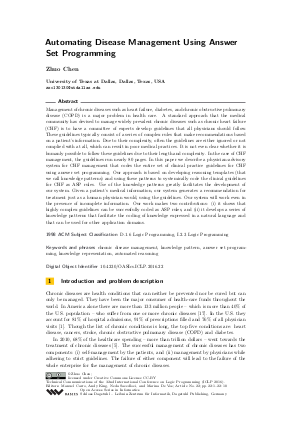Automating Disease Management Using Answer Set Programming
Author Zhuo Chen
-
Part of:
Volume:
Technical Communications of the 32nd International Conference on Logic Programming (ICLP 2016) (ICLP 2016 TCs)
Part of: Series: Open Access Series in Informatics (OASIcs)
Part of: Conference: International Conference on Logic Programming (ICLP) - License:
 Creative Commons Attribution 3.0 Unported license
Creative Commons Attribution 3.0 Unported license
- Publication Date: 2016-11-11
File

PDF
OASIcs.ICLP.2016.22.pdf
- Filesize: 340 kB
- 10 pages
Document Identifiers
Subject Classification
Keywords
- chronic disease management
- knowledge pattern
- answer set programming
- knowledge representation
- automated reasoning
Metrics
- Access Statistics
-
Total Accesses (updated on a weekly basis)
0Document
0Metadata
Abstract
Management of chronic diseases such as heart failure, diabetes, and chronic obstructive pulmonary disease (COPD) is a major problem in health care. A standard approach that the medical community has devised to manage widely prevalent chronic diseases such as chronic heart failure (CHF) is to have a committee of experts develop guidelines that all physicians should follow. These guidelines typically consist of a series of complex rules that make recommendations based on a patient's information. Due to their complexity, often the guidelines are either ignored or not complied with at all, which can result in poor medical practices. It is not even clear whether it is humanly possible to follow these guidelines due to their length and complexity. In the case of CHF management, the guidelines run nearly 80 pages. In this paper we describe a physician-advisory system for CHF management that codes the entire set of clinical practice guidelines for CHF using answer set programming. Our approach is based on developing reasoning templates (that we call knowledge patterns) and using these patterns to systemically code the clinical guidelines for CHF as ASP rules. Use of the knowledge patterns greatly facilitates the development of our system. Given a patient's medical information, our system generates a recommendation for treatment just as a human physician would, using the guidelines. Our system will work even in the presence of incomplete information. Our work makes two contributions: (i) it shows that highly complex guidelines can be successfully coded as ASP rules, and (ii) it develops a series of knowledge patterns that facilitate the coding of knowledge expressed in a natural language and that can be used for other application domains.
Cite As Get BibTex
Zhuo Chen. Automating Disease Management Using Answer Set Programming. In Technical Communications of the 32nd International Conference on Logic Programming (ICLP 2016). Open Access Series in Informatics (OASIcs), Volume 52, pp. 22:1-22:10, Schloss Dagstuhl – Leibniz-Zentrum für Informatik (2016)
https://doi.org/10.4230/OASIcs.ICLP.2016.22
BibTex
@InProceedings{chen:OASIcs.ICLP.2016.22,
author = {Chen, Zhuo},
title = {{Automating Disease Management Using Answer Set Programming}},
booktitle = {Technical Communications of the 32nd International Conference on Logic Programming (ICLP 2016)},
pages = {22:1--22:10},
series = {Open Access Series in Informatics (OASIcs)},
ISBN = {978-3-95977-007-1},
ISSN = {2190-6807},
year = {2016},
volume = {52},
editor = {Carro, Manuel and King, Andy and Saeedloei, Neda and De Vos, Marina},
publisher = {Schloss Dagstuhl -- Leibniz-Zentrum f{\"u}r Informatik},
address = {Dagstuhl, Germany},
URL = {https://drops.dagstuhl.de/entities/document/10.4230/OASIcs.ICLP.2016.22},
URN = {urn:nbn:de:0030-drops-67502},
doi = {10.4230/OASIcs.ICLP.2016.22},
annote = {Keywords: chronic disease management, knowledge pattern, answer set programming, knowledge representation, automated reasoning}
}
